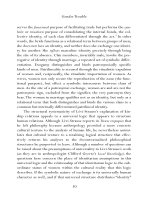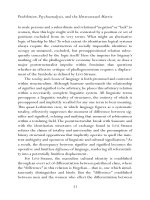GENDER TROUBLE 17
Bạn đang xem bản rút gọn của tài liệu. Xem và tải ngay bản đầy đủ của tài liệu tại đây (20.34 KB, 1 trang )
Gender Trouble
reader.10 The question of whether or not the theory of performativity
can be transposed onto matters of race has been explored by several
scholars.11 I would note here not only that racial presumptions invariably underwrite the discourse on gender in ways that need to be made
explicit, but that race and gender ought not to be treated as simple
analogies. I would therefore suggest that the question to ask is not
whether the theory of performativity is transposable onto race, but
what happens to the theory when it tries to come to grips with race.
Many of these debates have centered on the status of “construction,”
whether race is constructed in the same way as gender. My view is that
no single account of construction will do, and that these categories
always work as background for one another, and they often find their
most powerful articulation through one another.Thus, the sexualization
of racial gender norms calls to be read through multiple lenses at once,
and the analysis surely illuminates the limits of gender as an exclusive
category of analysis.12
Although I’ve enumerated some of the academic traditions and
debates that have animated this book, it is not my purpose to offer a
full apologia in these brief pages.There is one aspect of the conditions
of its production that is not always understood about the text: it was
produced not merely from the academy, but from convergent social
movements of which I have been a part, and within the context of a
lesbian and gay community on the east coast of the United States in
which I lived for fourteen years prior to the writing of this book.
Despite the dislocation of the subject that the text performs, there is a
person here: I went to many meetings, bars, and marches and saw
many kinds of genders, understood myself to be at the crossroads of
some of them, and encountered sexuality at several of its cultural
edges. I knew many people who were trying to find their way in the
midst of a significant movement for sexual recognition and freedom,
and felt the exhilaration and frustration that goes along with being a
part of that movement both in its hopefulness and internal dissension.
At the same time that I was ensconced in the academy, I was also living
xvi









